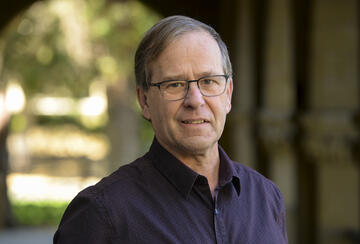CISAC - News Page
A Lead Author of the IPCC Sixth Assessment Report, Paul N. Edwards, talks about knowledge infrastructures and geoengineering, as well as policy and visual aspects of the landmark report on climate change.
Black Shadow & the Future of Cyberwarfare
The Jerusalem Press Club speaks to cybersecurity expert Dr. Gil Baram about the impact and significance of the Iranian-affiliated hackers' maneuver against a number of Israeli companies on Saturday.

China conducted a series of tests with nuclear-capable hypersonic weapons systems that have gotten the attention of officials across the U.S. government. The tests included a hypersonic glide vehicle — a delivery mechanism that can maneuver through the Earth’s atmosphere towards its target — and incorporated a fractional orbital bombardment system.

The U.S.-Russia Strategic Stability Dialogue, agreed by presidents Joseph Biden and Vladimir Putin at their June 2021 summit, has begun. It presumably is addressing the range of issues affecting strategic stability, including reductions in and limits on strategic offensive nuclear forces as well as questions related to missile defense.

China flight-tested a new breed of space weapon when it launched a massive “Long March” rocket tipped with a nuclear-capable, hypersonic glider. But history tells us why the test isn’t a cause for panic.

The oldest information system the government operates might also be the most crucial one. No, not the IRS master file system. It’s the technology that controls nuclear weapons. It dates to the 1950s. Yet imagine if the control systems were online in the age of ransomware.

China is tapping into broader anti-nuclear sentiment in the region to attack Australia’s nuclear submarine deal.

In 2018, U.S. Cyber Command released its Command Vision statement, advancing “defend forward” and “persistent engagement” as new elements in the United States’ approach to advancing its security interests in and through cyberspace. Since then, the debate has not included much discussion of the impact of other cyber powers adopting these concepts?
China's Race for AI Supremacy.
Jeffrey Ding is interviewed about China's AI policy. He tells Bloomberg's Quicktake about the misconception in the west that Beijing drives innovation. “You’re seeing companies lead the way. It’s not a necessarily a centralized top-down directive.”
Unregulated lithium (Li) growth is the major cause of low Coulombic efficiency, short cycle life and safety hazards for rechargeable Li metal batteries. Strategies that aim to achieve large granular Li deposits have been extensively explored, and yet it remains a challenge to achieve the ideal Li deposits.
The nuclear-capable missile flew through low-orbit space and circled the earth before landing about 40 km off target.

The Standstill Conundrum: The Advent of Second-Strike Vulnerability and Options to Address It
Emerging and disruptive technologies spell an uncertain future for second-strike retaliatory forces. New sensors and big data analysis may render mobile missiles and submarines vulnerable to detection. I call this development the “standstill conundrum”: States will no longer be able to assure a nuclear response should they be hit by a nuclear first strike.
The more countries involved in the discussion, the better but in the end you want to have global controls on cryptocurrency redemption.

The NPR must position President Biden to right-size America's nuclear forces and pursue arms control negotiations.

Senior Ukrainian officials have voiced concern that NATO has provided no clarity regarding Ukraine’s membership prospects. Specifically, when might Kyiv receive a membership action plan, known as MAP?

In clear, jargon-free prose, leavened with humor, Gottemoeller conveys both the facts and the flavor of an intense, high-stakes negotiation. The book is a highly enjoyable as well as useful master class in American diplomacy at its best.

“The Courtroom of World Opinion”: Bringing the International Audience into Nuclear Crises
What role does the international audience play in nuclear crises? Scholars of nuclear crises and deterrence have treated nuclear crises as dyadic interactions between two sides. However, states do not only interact with each other during a nuclear crisis. They also signal to a third actor—the international audience.

Facts are difficult to come by, myths are deeply ingrained, and uncertainties lurk everywhere — that, in short, is the nature of North Korea’s nuclear program.

Biden has an opportunity to bolster deterrence, reduce proliferation risks, and lower the risk of nuclear war.

The new AUKUS security partnership led to an immediate diplomatic fallout between France and the United States. But beyond the concerns about NATO and the Western alliance, or questions about great-power competition in the Pacific, some analysts see another worry: Will sharing nuclear submarine propulsion technology with Australia set back the nuclear nonproliferation regime?

Stanford historians are illuminating the complex story of environmental damage in San Francisco's Bayview-Hunters Point neighborhood.
A Better Australia Sub Deal
The Australian-British-U.S. submarine deal may be a brilliant stroke, but it was done without strategic imagination.

President Biden is reviewing America’s nuclear posture. By January, we should know what he thinks about U.S. nuclear weapons, what policies should govern them and how many we need. Congress is watching closely; senators and representatives always do. But this year will be different. A new player has entered the field — China.








